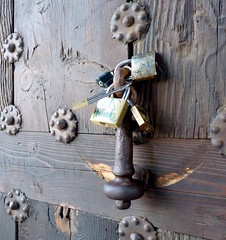 |
| Image by gianlucacostantini via Flickr |
I'm rounding up the year in a series of posts - in which no doubt I've missed something, so please let me know what I've missed in the comments!
Asylum and refugees
In May a Spanish academic estimated that 6000 LGBT Africans flee to Europe each year.
In the UK, authorities bureaucratically codified the landmark Supreme Court decision of 2010 ending the concept that refused asylum seekers could (and should) 'go home and be discreet' or relocate to avoid repression. They also began to record sexuality-based asylum claims.
This 'discretion' argument, widely employed to refuse asylum, was rejected by a US Ninth Circuit court in March but used in cases elsewhere.
In the Netherlands, 'westernization' after being in the country for a decade became an argument against the removal of an Afghan refugee, and by extension for others, that was accepted by the government. The Netherlands also created liberal rules for immigration of partners of gay people and said they'd consider extending a existing legal presumption in favour of LGBT asylum seekers from Iran, Iraq and Afghanistan to those from Uganda.
In the UK in an important precedent a court accepted that an individual who does not live a ‘heterosexual narrative’ (i.e. have men ‘calling’ or have a boyfriend/husband and/or have children) can suffer persecution and therefore have an asylum claim in a Jamaican lesbian case.
In the US there were numerous formal complaints over the treatment of LGBT immigration detainees, which includes asylum seekers. The complaints included sexual abuse but the administration refused to extend rules offering protection against rape and other sexual abuse to criminals in jails to immigration detainees. A number of prominent 'undocumented' immigrants came out, including many young people in the movement for a DREAM act which would regularize the status of those brought to the US as children. There were reports that Mexican asylum seekers' claims in the US are increasingly being rejected, using the 'relocation=safety' argument.
Human rights groups started to focus on the position of LGBT in African refugee camps and the thousands believed to have made their way to relative safety in South Africa. The first LGBT refugee project started in May in South Africa. A landmark conference in Kampala in July covered the problem of LGBT refugees in East Africa.
In May the first public appearance of Iranian LGBT refugees happened in Turkey during Ankara Pride.
LGBT asylum seekers continue to face problems in Europe with campaigning attention in 2011 including: a Swiss attempt to remove a gay Iranian; a gay Cameroonian in France; several gay Ugandan, Burundian, Cameroonian and Nigerian cases in UK; a Norwegian gay Iraqi case; a transgender Turkish case in Austria. In Canada, a loud campaign in Toronto stopped the removal of a gay Nicaraguan, as did support for a Sri Lankan in Australia. Most - though not all - such cases demonstrated how campaigning can help stop removals. In the UK, in several cases, judges ordered the anonimization of lesbian and gay asylum seekers supposedly for their protection but also stemming both media coverage and campaigning highlighting such egregious asylum decisions.
In September a first comprehensive report showed prejudiced treatment of LGBT asylum seekers happening in many European countries. But in October, most EU nations adopted rules recognising repression for sexuality reasons as grounds for asylum claims and also gender identity for the first time. They also agreed to share best practice on treatment of LGBT asylum cases.
In Australia a law was passed clarifying protection rights for homosexual refugees.
It emerged in October that key global south LGBT activists are increasingly encountering visa problems when they are invited to events in western countries.
Azerbaijani gay artist Babi Badalov finally won asylum in France after being deported by the UK two years previously, then fleeing to Russia and finally reaching Paris.
In Canada, the conservative government reached out to LGBT groups and the community to support LGBT refugees - and provided funding to help. In the US the administration provided funding for a first LGBT asylum support project in Chicago and a new refugee route began to deliver LGBT to sanctuary in San Francisco.
In August a report confirmed significant progress in UNHCR and other agency handling of gay refugees, mostly Iranians, in Turkey, an example of growing engagement by UNHCR with the issue.





















![Reblog this post [with Zemanta]](http://img.zemanta.com/reblog_e.png?x-id=a8073be2-cbfa-4b14-b8a1-0462c2fbeb4f)

![Reblog this post [with Zemanta]](http://img.zemanta.com/reblog_e.png?x-id=7d4a785c-3039-481e-ab68-65b15ca66352)





 Join our page
Join our page

